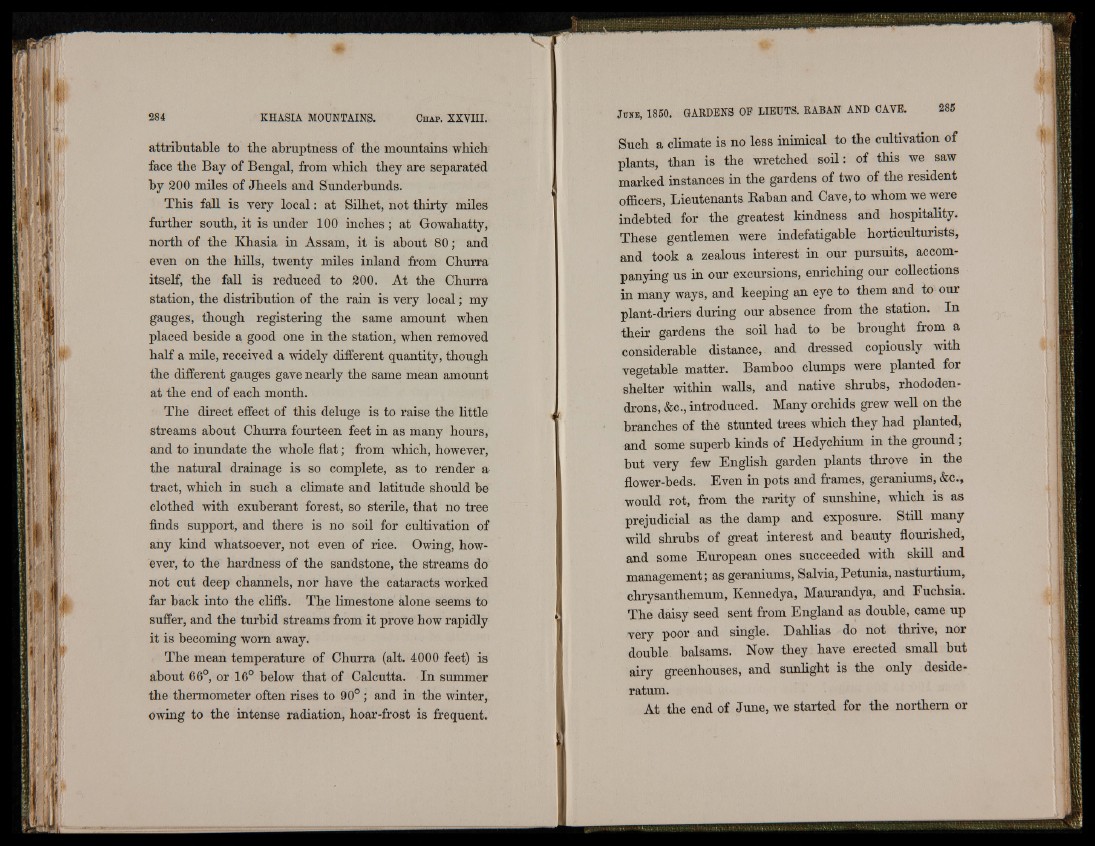
attributable to the abruptness of the mountains which
face the Bay of Bengal, from which they are separated
by 200 miles of Jheels and Sunderbunds.
This fall is very local: at Silhet, not thirty miles
further south, it is under 100 inches; at Gowahatty,
north of the Khasia in Assam, it is about 80; and
even on the hills, twenty miles inland from Churra
itself, the fall is reduced to 200. At the Churra
station, the distribution of the rain is very local; my
gauges, though registering the same amount when
placed beside a good one in the station, when removed
half a mile, received a widely different quantity, though
the different gauges gave nearly the same mean amount
at the end of each month.
The direct effect of this deluge is to raise the little
streams about Churra fourteen feet in as many hours,
and to inundate the whole flat; from which, however,
the natural drainage is so complete, as to render a
tract, which in such a climate and latitude should be
clothed with exuberant forest, so sterile, that no tree
finds support, and there is no soil for cultivation of
any kind whatsoever, not even of rice. Owing, however,
to the hardness of the sandstone, the streams do
not cut deep channels, nor have the cataracts worked
far back into the cliffs. The limestone alone seems to
suffer, and the turbid streams from it prove how rapidly
it is becoming worn away.
The mean temperature of Churra (alt. 4000 feet) is
about 66°, or 16° below that of Calcutta. In summer
the thermometer often rises to 90° ; and in the winter,
owing to the intense radiation, hoar-frost is frequent.
Such a climate is no less inimical to the cultivation of
plants, than is the wretched soil: of this we saw
marked instances in the gardens of two of the resident
officers, Lieutenants Raban and Cave, to whom we were
indebted for the greatest kindness and hospitality.
These gentlemen were indefatigable horticulturists,
and took a zealous interest in our pursuits, accompanying
us in our excursions, enriching our collections
in many ways, and keeping an eye to them and to our
plant-driers during our absence from the station. In
their gardens the soil had to be brought from a
considerable distance, and dressed copiously with
vegetable matter. Bamboo clumps were planted for
shelter within walls, and native shrubs, rhododendrons,
&c., introduced. Many orchids grew well on the
branches of the stunted trees which they had planted,
and some superb kinds of Hedychium in the ground ;
but very few English garden plants throve in the
flower-beds. Even in pots and frames, geraniums, &c.,
would rot, from the rarity of sunshine, which is as
prejudicial as the damp and exposure. Still many
wild shrubs of great interest and beauty flourished,
and some European ones succeeded with skill and
management; as geraniums, Salvia, Petunia, nasturtium,
chrysanthemum, Kennedya, Maurandya, and Fuchsia.
The daisy seed sent from England as double, came up
very poor and single. Dahlias do not thnve, nor
double balsams. Now they have erected small but
airy greenhouses, and sunlight is the only desideratum.
At the end of June, we started for the northern or